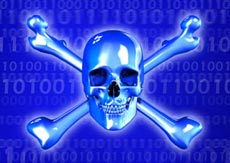Malicious code is growing up
Security firm McAfee warns that malicious code is currently on the way to prepare to reach a new level of complexity and professionalism.
Not only the malicious code and adware are now becoming a professional service that is distributed and operated at a direct level of antagonism with some enterprise applications.
McAfee's director of security and communications research David Marcus said that even today some legitimate advertisers are starting to care about adware (spyware) and spyware (spyware). .
Therefore, an attractive market for malicious code and security exploit code has been established and contributes to the development of malicious code for both illegal and legal purposes.
 " More and more legitimate companies understand the power of spyware ."
" More and more legitimate companies understand the power of spyware ."
Ignoring the power of advertising scams, spyware and adware make many compelling companies turn into black spots in their businesses.
For example, ad maker Zango has recently received a lot of criticism when entering that "black spot" and becoming a form of malicious code. The company has been penalized by the US Federal Trade Commission for installing illegal software on users' systems.
" Many adware do legal work, " Marcus said. " We have legitimate advertising firms that are allowed to collect data, but there are also many similar companies that cross the category into black spots ."
McAfee predicts hackers will quickly adopt more professional operating methods and apply new technologies to develop more dangerous new types of spyware.
For example, RFID technology may give legitimate applications such as tracking goods but can also be used by terrorists to identify foreigners through RFID data on their passports.
Or Bluetooth technology is also very attractive spyware because this technology is widely used and few people care about connection security.
According to Mr. Marcus, the ultimate goal of malicious code is still a real financial benefit.
Hoang Dung
You should read it
- ★ The list of applications containing malicious code or malicious ads should be removed from the phone
- ★ CertUtil.exe allows an attacker to download malicious code and bypass antivirus software
- ★ Spyware detected behind Opera
- ★ Warning: New malicious code is infecting about 500,000 router devices
- ★ 14 games on the App Store contain malicious code, iPhone users be careful